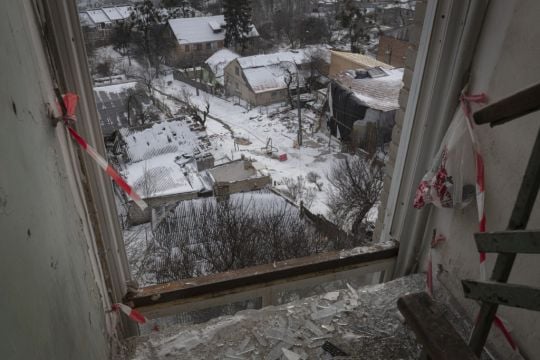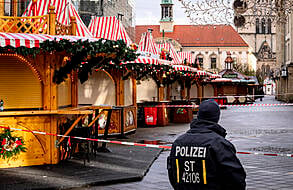A missile attack on critical infrastructure is under way in the Ukrainian capital Kyiv, officials said.
Deputy head of Ukraine’s presidential office Kyrylo Tymoshenko wrote on Telegram that an assault was under way as a series of explosions and air raid sirens were heard in Kyiv on Saturday morning.
City mayor Vitali Klitschko said that “explosions were heard in Dniprovskyi district, left bank of Kyiv”.
In a separate Telegram post, Mr Klitschko said fragments of a missile fell on a non-residential area in Holosiivskyi district, on the right bank, and added that no casualties were reported.

It was not immediately clear whether the explosions were caused by the strikes or by air defence systems operating.
The Ukrainian capital has not been attacked since New Year’s Day.
In the outlying Kyiv region, a residential building in the village of Kopyliv was hit, and windows of the houses nearby were blown out, Mr Tymoshenko said.
Earlier on Saturday, two Russian missiles hit Kharkiv, Ukraine’s second largest city, the governor of the region reported.

Oleh Syniehubov said Russian forces fired two S-300 missiles at the industrial district of Kharkiv. The extent of the damage from the strike was not immediately clear, but no casualties have been reported.
The attacks come amid conflicting reports on the fate of the fiercely contested salt mining town of Soledar, in Ukraine’s embattled east. Russia claims that its forces have captured the town, a development that would mark a rare victory for the Kremlin after a series of humiliating setbacks on the battlefield.
However, Ukrainian authorities and President Volodymyr Zelensky insist the fight for Soledar continues.
Moscow has painted the battle for the town and the nearby city of Bakhmut as key to capturing the eastern region of the Donbas, which comprises of partially occupied Donetsk and Luhansk regions, and as a way to grind down the best Ukrainian forces and prevent them from launching counter-attacks elsewhere.
But that cuts both ways, as Ukraine says its fierce defence of the eastern strongholds has helped tie up Russian forces. Western officials and analysts say the two towns’ importance is more symbolic than strategic.







